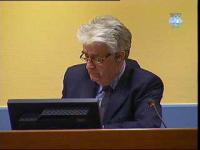 A year after the wartime president of Republika Srpska was arrested, war victims and legal analysts in Bosnia say it is high time for his trial to begin.
A year after the wartime president of Republika Srpska was arrested, war victims and legal analysts in Bosnia say it is high time for his trial to begin.
Exactly one year since the arrest of Radovan Karadzic in Belgrade, it is still unknown when his trial, considered by many as the most important war-crimes case in recent history, will begin.
Until recently the trial was expected to start in late August. However, at a status conference held at the beginning of July,an International Criminal Tribunal for the former Yugoslavia’ (ICTY) justice, Judge Iain Bonomy, said it would be more realistic to schedule the commencement of the trial for some time in September.
Sarajevo legal expert Dr. Dennis Gratz says the fact that the Karadzic trial has still not begun suggests “that the ICTY may not have been sufficiently prepared for his arrest”.
“The fact is that Karadzic is using the statute, which simply gives him an opportunity to extend and delay the beginning of the trial. It is clear that this is a problem facing the court. The fact that preparations have been ongoing for one year is down to him. This must be stopped,” Gratz said.
The first indictment against Karadzic was filed in July 1995. It was amended in November of that year and further changes were introduced in 2000 and 2008. The latest version was filed by the ICTY Prosecution on May 22, 2009.
The Hague Prosecution considers Karadzic responsible for genocide committed in 10 municipalities in Bosnia and Herzegovina and Srebrenica; a joint criminal enterprise; and crimes committed in 27 municipalities, with the siege of Sarajevo a particular focus.
Senida Karovic, of the Association of Civil Victims of War of Sarajevo Canton, told BIRN Justice Report that members of her association are “totally disappointed” by the fact that the start date of Karadzic’s trial has still not been set.
“I think that he currently feels as if he is in some kind of hotel at The Hague. He gets whatever he asks for. This is too much. It seems as if he won a prize and was sent to The Hague. The situation has been reversed, because it appears that we are the executioners and the criminals are victims. They committed crimes which cannot be paid for or calculated. The human mind cannot comprehend such crimes. Now they enjoy company and they are allowed to waste time,” Karovic said.
Karadzic has refused to enter a plea to the charges contained in the indictment on several occasions, claiming that the Tribunal has “no right” to try him, because of an agreement he says he concluded in 1996.
“I must say that Richard Holbrooke and the USA gave me and my associates an offer, back in 1996, asking me to undertake some actions and withdraw from public life, while he was supposed to fulfill his commitments in turn. This was done in the name of the USA and not in the name of Holbrooke as an individual. My obligation was to withdraw from public life and even from literary circles,” Karadzic said at the status conference, held on July 31, 2008.
Richard Holbrooke was an envoy to the Balkans during the term of US President Bill Clinton. The US State Department and Holbrooke himself have repeatedly denied that any immunity deal was reached with Karadzic.
In the end, the Trial Chamber rendered a decision, saying that “the possible existence” of an agreement will not affect the course of the trial, because such an agreement was “not binding for the Hague Tribunal”. Karadzic objected to the decision and a final ruling is still pending.
Gratz believes that “any agreement with a US envoy would be considered irrelevant to this indictment”.
“Under international law, not one count contained in this indictment can be disputed as a result of some agreement with Holbrooke. Even if there was an agreement, its provisions are totally irrelevant to the course of this trial,” Gratz said.
At one status conference, Prosecutor Alan Tiger announced that the Hague Prosecution would need around 490 hours to present its evidence and to call more than 150 witnesses.
Karadzic has said that he will deny all allegations contained in the indictment, claiming that he did not “plan, order or in any way motivate the crimes charged upon him”.
“Dr. Karadzic intends to defend himself with respect and dignity. If the law is applied in a fair manner and the truth on the events that took place in Bosnia is revealed, he is sure that the Trial Chamber will find him not guilty,” the motion filed by the indictee with the tribunal in late June this year, reads.
Gratz believes that the Karadzic trial will be the most important for Bosnia and Herzegovina.
“His trial, being the trial of a political leader and supreme military commander, will determine the character of the war conducted in Bosnia and Herzegovina,” he said.
 Eurasia Press & News
Eurasia Press & News


